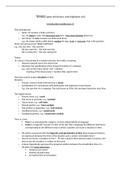Summary
Summary of the 'Tenses' section of English Linguistics I
- Course
- Institution
Full summary of “Tenses.” Other parts of the English Linguistics course are: 'Modality', 'The Noun Phrase' and 'Phonetics and Phonology' (see my other summaries). Teached by Dr. Maekelberghe. With my summaries, I achieved 16/20 for the full course.
[Show more]



